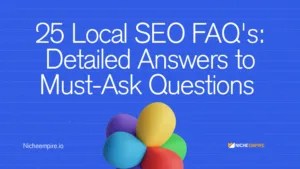Local search engine optimization can be complex, especially for beginners and intermediate SEO users. Sometimes, even people with SEO experience also have questions they need clear answers to.
This article will give you detailed answers to frequently asked local SEO questions. It will improve your understanding of local search and help you reach your target audience.
1. What is Local SEO?
Local search engine optimization (local SEO) is a strategy that helps businesses improve their online visibility in local search results on search engines.
It is a form of digital marketing that targets online searches on search engines like Google and Bing. Local SEO involves optimizing your business’s online presence to attract more people from nearby.
When done correctly, local SEO can increase brick-and-mortar businesses’ sales. It increases their chances of appearing in local search results when people search for their products or services online.
More information on local SEO statistics.
2. How is Local SEO Different from Traditional SEO?
This is one of the commonly asked questions in local SEO. As previously explained, local SEO optimizes a business’s online presence to attract more people in a geolocation.
On the other hand, traditional SEO focuses on optimizing your website to rank higher in search results without paid ads. However, both involve keyword analysis, writing quality content, and other optimization forms.
Check out our detailed guide on local SEO for small businesses.
3. What are The Pillars of Local SEO?
You have to understand the pillars or key areas of local SEO to implement it effectively. They boost visibility on local search results and drive targeted traffic to your business.
The pillars of local search engine optimization include:
Local On-Page Optimization
Local on-page optimization involves optimizing your web content, meta tags, and other elements to target relevant keywords in a specific location.
You will use location-specific keywords and optimize meta titles and descriptions for local intent.
The steps for local on-page optimization include:
- Adding location-specific keywords to your website content.
- Creating content relevant to your target location or service area.
- Optimizing your titles, meta descriptions, and header tags with your primary local keyword.
- Include accurate NAP information (Name, address, and phone number) on your website and across all platforms.
Local Listings and Citations
Local listings and citations are online directories and platforms for listing websites and business information. They include Google Business Profile, Yelp, and Yellow Pages.
Optimizing and managing your business listings helps search engines like Google understand the nature of your business and who you serve.
Steps for local listings and citations include:
- Create and optimize your Google Business Profile using correct business information, categories, and clear images.
- Enlist your business in relevant local directories and review sites.
- Ensure your NAP information is consistent across all listings and citations.
Online Reviews
Reviews reveal your customer’s opinions or views that show their experience with your business, so they play an essential role in SEO rankings.
Positive reviews and ratings influence potential customers and your ranking on local search results.
Encourage your customers to leave honest reviews about your business on listing platforms to help build trust, credibility, and visibility.
Key steps for online reviews:
- Encourage customers to leave an honest review on platforms like Google, Yelp, and your industry review sites.
- Respond to both positive and negative reviews promptly and professionally.
- Monitor and manage your online reviews by addressing customer feedback and resolving issues.
4. What is the Best Strategy for Local SEO?
This is a typical local SEO question SEO specialists often ask. Many strategies exist for local search engine optimization; none can be considered the best.
However, multiple techniques can improve your visibility and ranking on local search results.
Some of these techniques include:
Claim and Optimize Your Google Business Profile
Ensure your profile has accurate NAP (Name, Address, Phone number), categories, business hours, descriptions, and images. This is important for ranking on Google’s Local Pack.
Use Relevant Local Keywords
Include relevant local keywords, titles, meta descriptions, and blog posts in your website content.
Build Local Citations
List your business website on major listing directories like Bing Places, Yelp, or Apple Maps. Use consistent NAP information, as this helps to improve your credibility and impacts search rankings.
Encourage and Manage Reviews
Encourage satisfied customers to leave reviews on your site. Positive reviews on Google and other platforms boost trust and respond to all positive or negative reviews.
Create Local Contents
Write blog posts, guides, and case studies to suit local search intent and concerns. Your content should meet the needs of your local community and offer solutions with your product or service.
5. How do you Research Local SEO keywords?
You can find local keywords with SEO tools like Niche Empire, Google Keyword Planner, SEMrush, Ahrefs, and Moz.
These tools will help you identify search terms that potential customers in your location when searching for your products and services.
You can use the following steps to carry out local keyword research:
Understand Your Audience and Services
Consider keywords related to your business, service, and the location you serve or intend to serve. For example, “emergency plumber in Dallas” or “Personal Injury Attorney in New Jersey.”
Use Keyword Research Tools
Use tools like Niche Empire, Google Keyword Planner, Ahrefs, or SEMrush to find location-specific keywords with good monthly search volume.
Consider long-tail keywords like “affordable HVAC repair in Austin.”
Long-tail keywords are usually less competitive and have a higher chance of ranking high on the search engine result page (SERP).
Use Google Autocomplete
Attempt to type queries into Google Search and take note of the list of suggested phrases or questions. They typically reflect what users are actively searching for.
Analyze Competitor Keywords
Analyze your top competitors’ websites and Google Business Profiles for the keywords they’re ranking for. Tools like Niche Empire and Moz can help you with the analysis.
Focus on “Near Me” Keywords
Keywords like “coffee shop near me” “and restaurants near me” are crucial for local search optimization and voice search visibility. Create content with the “near me” keywords for your website.
6. How Do You Begin Local SEO As a Beginner?
Some local search engine optimization concepts can be unfamiliar to beginners.
So, if you’re new to local SEO, here’s a simple approach to get started and improve your business’s visibility and rankings on local searches:
Set Up Your Google Business Profile
Create and claim your business profile on Google. Your profile should include accurate information like your business name, address, phone number (NAP), website, business hours, and relevant categories.
In addition, clear visuals like high-quality pictures or videos should be added to increase the appeal.
Optimize Your Website for Local Search
Optimize your website to include location-specific keywords like “dentist in Chicago.” These keywords should appear in your website content, meta descriptions, headers, and URLs.
Because more people use their smartphones for online searches, ensure your website is mobile-friendly and fast-loading.
Build Local Citations
List your business on standard directories like Yelp, Bing Places, Apple Maps, and Yellow Pages. Ensure your business information is consistent across all the platforms.
Create Localized Content
Write blog posts and guides for local search intent. Your content should answer locals’ questions, meet the needs of your local community, and proffer your product or service as a solution.
Monitor Performance
Monitor your site performance regularly using tools like Google Analytics and Google Search Console. Track your traffic source and local SEO performance.
7. What’s a Local Business’s SEO “to-do List”?
A checklist or to-do list improves search visibility, attracts nearby customers, and drives more website traffic and your local SEO effort.
SEO to-do list for a local business include:
- Claim and Optimize Your Google Business Profile
- Find and use Location-Specific Keywords
- Build Consistent Local Citations
- Encourage Customer Reviews
- Create Content for Local Intent
- Optimize for Mobile and Voice Search
- Implement Local Schema Markup
Use our local SEO checklist to meet your SEO goals.
8. What is the Best URL Structure for Local SEO?
This is an important local SEO question that requires critical attention. The URL structure for a local SEO must be clear, concise, and optimized for both search engines and searchers.
A well-structured URL improves your website’s relevance, user experience, and rankings on search engines.
Here’s how you can create an effective local SEO URL structure:
- Include your target keyword in the URL. For example www.example.com/los-angeles-plumbing-services
- Keep the URL short and simple, avoiding unnecessary words or numbers. A short URL is easy for searchers to read, remember, and share.
- Use hyphens to separate words. For example www.example.com/chicago-hvac-repair
- Structure your URLs to represent your services and locations. For example www.example.com/locations/new-york/electrical-services
- Maintain a uniform format across all location and service pages to improve user navigation.
9. Is Google the Only Search Engine I Need for Local SEO?
While Google is the most visited search engine, others like Bing and DuckDuckGo also have significant daily traffic.
Ensure you list and optimize your business for Google and other search engines.
10. Why are Online Business Listings Important?
Listing your business online ensures that people around your locality can find you, directly impacting your sales and customer retention.
So, they are essential for businesses because they enhance credibility and visibility.
The importance of online business listing includes:
Increased Online Visibility
Listing your business on leading directories and search engines like Google My Business, Bing Places, and Yelp helps you build awareness.
It makes it easier for potential customers to find you when they search for your products or services.
Increased Credibility and Trust
Online business listings provide opportunities for customers to leave reviews. Positive reviews and ratings enhance your business’s credibility, build trust, and can impact purchasing decisions.
People are more likely to patronize a business with more positive reviews.
Free Marketing and Cost Effective Advertising
Listing on platforms like Google My Business is free, offering businesses a valuable means to market their brands online.
It’s a cost-effective form of advertising that provides local traffic at little to no cost.
Make You Stand Out from Competitors
The business world is fierce and highly competitive; an optimized business listing can give you an edge.
A complete and updated business profile with information like hours, services, and photos can differentiate your business from others who have yet to list theirs.
11. What Makes Local SEO Powerful?
Relevance, distance, and reputation are the core strengths of local SEO.
- Relevance: Your content and business information must match what people search in their locality.
- Distance: Optimize your profile and content to serve people around you.
- Reputation: Build credibility online to gain the trust of potential customers.
12. Can Listing Categories Affect my Rankings?
Categories are essential when listing your business online because your business will only appear on searches related to your chosen categories.
Optimize your listing and select the proper business categories.
Find out more about local SEO ranking.
13. Can I Delete Bad Reviews from Google My Business Listing?
Businesses with bad reviews often ask if this won’t affect local SEO. Unfortunately, a company cannot remove or delete a negative review from Google My Business Listing.
However, you can flag or report a review for removal. If the reported review violates Google’s policy, the review will then be removed.
Also, bad reviews often serve as a feedback mechanism for a better customer experience.
14. Can Incomplete Information Affect My Google My Business Rankings?
Yes, incomplete information can affect your Google My Business ranking. Optimize your listing by providing complete and updated business information.
15. Since Reviews Help Rankings, Can I Reward Clients for Positive Reviews?
You should not pay customers to leave positive reviews; it is against Google’s policy. Do not give your customers incentives for reviews by offering giveaways or money,
You can ask for reviews by text or email, but refrain from attaching a reward to it.
16. How To Optimize Business Listing For Multiple Location Businesses?
Optimizing a business for multiple locations needs targeted strategies to rank and improve visibility in all business locations.
You can start by creating and optimizing Google Business Profiles for each location and provide accurate and consistent information.
Additionally, local content such as blog posts or guides should be created to meet the needs of people for each business location.
17. What Kinds of Businesses Should Use Local SEO?
Digital marketing agencies often ask this question about local SEO to decide if their clients can adopt the strategies.
Businesses serving specific locations can use local SEO strategies to grow their brands and reach more people. It showcases your products and services to people in your locality.
Thinking about hiring an SEO expert? Here’s what to know about local SEO outsourcing.
18. Can Social Media Boost a Company’s Ranking on Search Results?
Yes, social media influences search ranking. While posting on social media has no direct effect, it contributes indirectly and boosts your ranking on search engines.
Social media platforms like LinkedIn, Facebook, or Instagram provide a source of traffic to your website and store. Also, engagement like shares and likes help link your web content, and those links can improve SEO over time.
19. How Do I Define My Target Audience?
You can define your target audience based on demographic factors such as age, occupation, income, education level, marital status, and more.
You can also identify them by psychographic factors like lifestyle, personality, hobbies, values, and beliefs.
It’s best to define your target audience using demographic and psychographic factors.
20. How do I Detect Toxic or Low-quality Backlinks on my Site?
To detect a toxic or low-quality backlink, use these criteria:
- Check if the anchor text is suitable.
- Determine if the linking page contains relevant and quality content.
- The linking web’s domain quality and relevance.
- The link location within the web content.
21. How do I Attract more Customers to My Physical Location?
Local SEO aims to drive conversion and get more customers to stores. Do this by optimizing your Google Business Profile with accurate details and visuals.
Use local keywords on your web content, encourage positive reviews, and promote offers that suit local demand.
22. What Keywords are Essential to My Business?
Essential keywords are phrases or words related to your products or services. For example, “plumbing repair” is relatable to the plumbing business.
Also, location-specific keywords like “plumber in Chicago” are helpful.
You can research your competitors’ and customers’ online queries for relevant and long-tail keywords.
23. What Softwares are Needed to Track Local SEO Metrics
Tracking your local SEO performance is a critical aspect of the SEO process. It tells you if you’re achieving your local SEO goals or not. You will also get insight on necessary improvements to make.
The software for monitoring local SEO metrics includes:
- Niche Empire
- Google Analytics
- Google Search Console
- SEMrush
- Whitespark
- SEOprofiler
- Yext
- Bright Local and
- Local Falcon
24. How Do I Stay Up-to-date With Local SEO Trends?
SEO strategies are constantly evolving, and it is necessary to stay updated. You have to keep acquiring knowledge of the latest working strategies by following new information.
You can also sign up for newsletters from leading SEO companies and website authorities.
25. How do you Measure the Success of a Local SEO Campaign?
You must measure your local SEO performance by tracking key performance indicators (KPIs).
Google Business Profile Insights reveals search impressions, reviews, and customer actions, such as calls, website clicks, and direction requests.
Use Google Analytics to track the source and number of local traffic to your website.
Lastly, metrics like the rate of form submissions, store visits, or purchases will show you the local SEO impact and return on investment (ROI).
Conclusion
Local SEO is an effective strategy that improves online visibility, attracts customers, and grows your business within your local community.
By carefully reviewing these questions and answers on local SEO, you can grow your business online presence and connect with customers around you.



